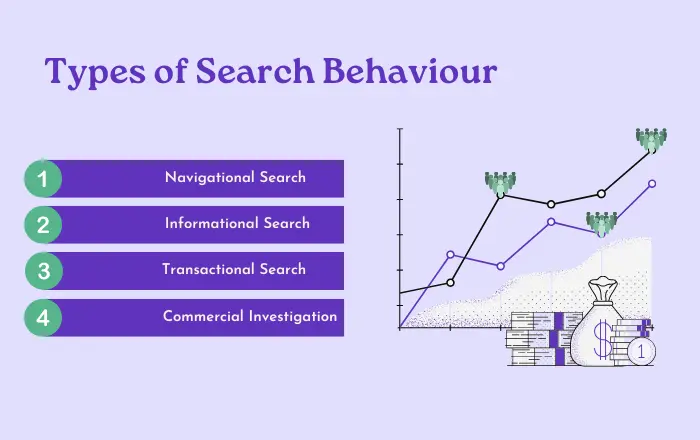Understanding search behaviour in digital marketing is essential for improving your business’s online presence. It reveals how users interact with search engines and the kind of content they expect to find. By analyzing search behaviour, marketers can tailor their content, boost SEO performance, and reach the right audience effectively.
Table Of Content
What is Search Behaviour in Digital Marketing?

Search behaviour in digital marketing refers to the way users search for information online. It encompasses various factors such as keywords, search intent, and patterns of browsing. By analyzing these behaviours, businesses can optimize their marketing strategies, improve user experience, and increase conversion rates.
Importance of Understanding Search Behaviour
Understanding search behaviour in digital marketing enables businesses to:
- Optimize content for relevant keywords
- Meet user intent by providing relevant answers
- Boost SEO ranking by targeting appropriate keywords
- Improve user engagement by addressing their needs
- Increase conversions through personalized content
Types of Search Behaviour

Users typically exhibit different kinds of search behaviour. Here’s a breakdown:
| Type of Search Behaviour | Description |
|---|---|
| Navigational Search | When users search to find a specific website or page. Example: “Facebook login.” |
| Informational Search | When users seek information on a topic. Example: “What is digital marketing?” |
| Transactional Search | When users intend to complete a transaction. Example: “Buy running shoes online.” |
| Commercial Investigation | When users compare products or services. Example: “Best laptops under $1000.” |
How to Analyze Search Behaviour in Digital Marketing
To analyze search behaviour in digital marketing, follow these steps:
1. Track Keyword Data
- Use tools like Google Analytics and SEMrush to track what keywords drive traffic to your website.
- Look for long-tail keywords that reflect user intent.
2. Monitor User Interaction
- Pay attention to bounce rates and session duration to understand how engaged users are with your content.
- Check if users navigate to multiple pages or leave after viewing one page. This tells you if your content is meeting their needs.
3. Analyze Search Intent
- Search intent refers to the purpose behind a search query. It could be informational, navigational, transactional, or commercial.
- Optimizing content based on search intent improves both user satisfaction and ranking potential.
4. Study Competitor Strategies
- Research your competitors to understand the kind of keywords they are targeting and their approach to content.
- Use competitive analysis tools like Ahrefs or Moz to see what is working for them.
Impact of Search Behaviour on SEO
The impact of search behaviour in digital marketing on SEO is significant. When businesses align their SEO strategies with user search behaviour, they are more likely to:
- Appear in relevant search results by optimizing for the right keywords
- Attract organic traffic through content tailored to what users are looking for
- Enhance user experience by providing answers that match the searcher’s intent
Tips to Optimize SEO Based on Search Behaviour
- Use Relevant Keywords: Choose keywords that match user queries.
- Update Content Regularly: Keep your content fresh and aligned with trending searches.
- Optimize for Mobile: Since many users search on mobile devices, ensure that your site is mobile-friendly.
- Provide Clear Answers: Focus on creating content that answers common questions or solves problems quickly.
- Improve Page Load Speed: A faster website keeps users engaged and improves SEO ranking.
Tools to Analyze Search Behaviour in Digital Marketing
Analyzing search behaviour in digital marketing requires the right tools. Here are some tools to consider:
- Google Analytics: Tracks user behaviour and traffic patterns.
- SEMrush: Analyzes keyword performance and competitor SEO strategies.
- Ahrefs: Helps you understand backlinks and keyword strategies.
- Moz: Offers tools for keyword research and site audits.
- Google Search Console: Provides insights into how your website is performing in Google search results.
Adapting to Changing Search Behaviour
The digital landscape is always evolving, and so are user behaviours. To stay ahead:
- Monitor Trends: Stay updated on changing trends in search queries and adapt your content accordingly.
- Focus on Voice Search: With the rise of voice search, optimize your content for conversational keywords.
- Incorporate AI Tools: Use AI-powered tools like chatbots and personalized content recommendations to meet user expectations.
Voice Search and Its Impact
With the growing use of voice assistants like Siri and Alexa, voice search is becoming a dominant force in search behaviour in digital marketing. Voice searches are more conversational and often longer than text-based queries. Optimizing your content for voice search can help you:
- Rank for natural language queries
- Appear in featured snippets
- Boost local SEO by targeting “near me” searches
Also Read:- Fincore Digital Marketing: The Power of Financial Core Strategies
Conclusion
In summary, understanding and analyzing search behaviour in digital marketing is crucial for businesses aiming to improve their online presence. By optimizing your content based on search intent, using the right tools, and staying updated with changing trends, you can enhance user experience and boost SEO rankings. As the digital landscape evolves, so must your strategies to meet the demands of modern search behaviour.
FAQ
What is search behaviour in digital marketing?
Search behaviour refers to how users interact with search engines and what they expect to find when searching for information online. It includes factors like keywords, search intent, and browsing patterns.
Why is search behaviour important for SEO?
Understanding search behaviour helps businesses optimize content for relevant keywords, meet user intent, and improve SEO rankings by aligning with what users are looking for.
How can I analyze search behaviour for my website?
Use tools like Google Analytics, SEMrush, and Google Search Console to track keyword performance, monitor user interaction, and analyze search intent to improve your content and SEO strategy.
What tools can help me understand search behaviour?
Tools like Google Analytics, SEMrush, Ahrefs, Moz, and Google Search Console provide insights into how users are searching, which keywords are driving traffic, and how your website is performing.






